Analyzing Stress in the Hospitality Industry: A Detailed Report
VerifiedAdded on 2023/04/22
|9
|1764
|462
Report
AI Summary
This report examines the factors contributing to increased stress among hospitality employees worldwide, including time constraints, uncertain rules, resource scarcity, and physical demands. It explores strategies employees can use to reduce stress, emphasizing the importance of employer support. A collaborative approach between employees and employers is crucial for enhancing employee retention, promoting well-being, and improving profitability within hospitality companies. The report highlights the need for realistic deadlines, prioritization, clear communication, and access to resources to mitigate stressors. It also suggests mindfulness techniques and lifestyle adjustments for employees, alongside recommendations for employers to foster a supportive and motivating work environment through benefits and encouragement of physical activity.
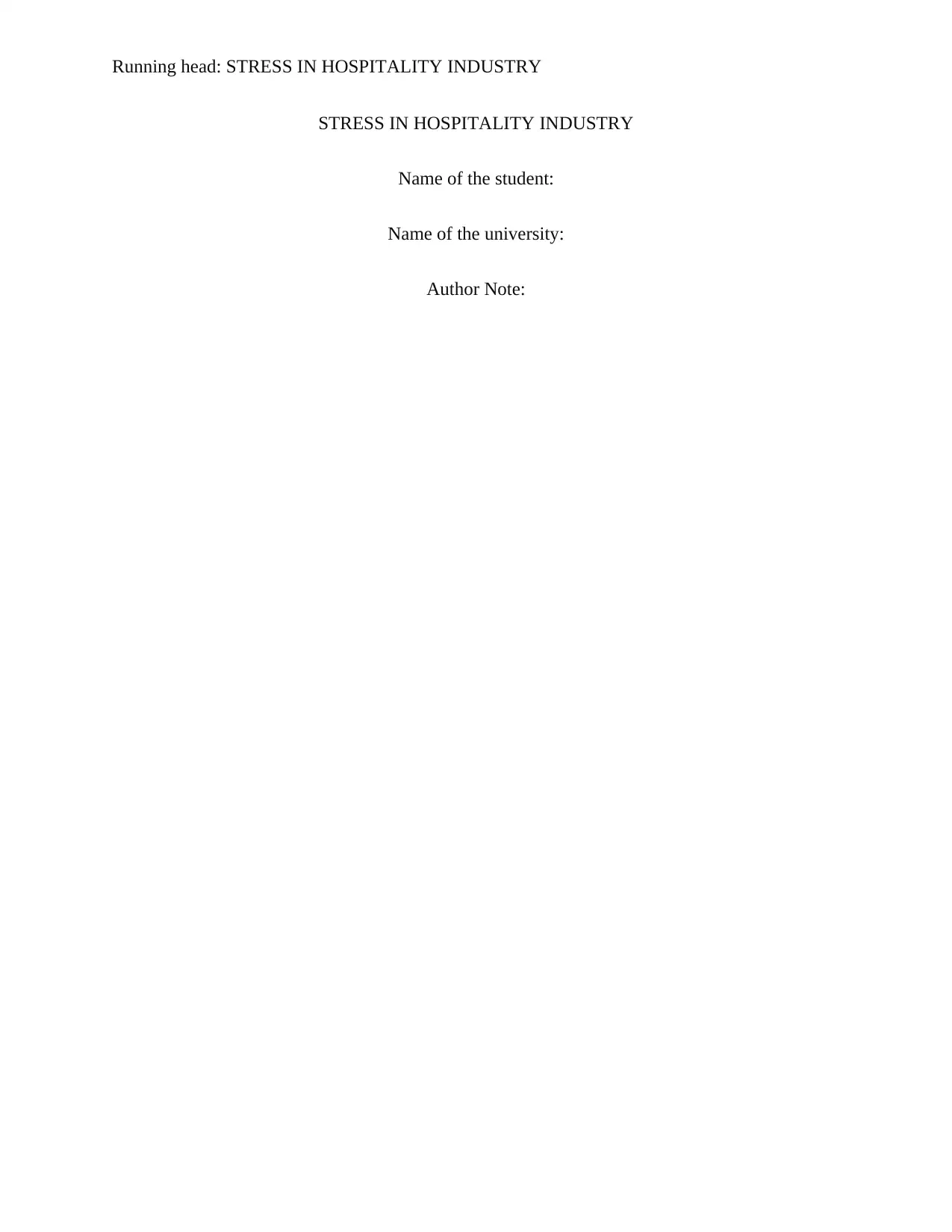
Running head: STRESS IN HOSPITALITY INDUSTRY
STRESS IN HOSPITALITY INDUSTRY
Name of the student:
Name of the university:
Author Note:
STRESS IN HOSPITALITY INDUSTRY
Name of the student:
Name of the university:
Author Note:
Paraphrase This Document
Need a fresh take? Get an instant paraphrase of this document with our AI Paraphraser
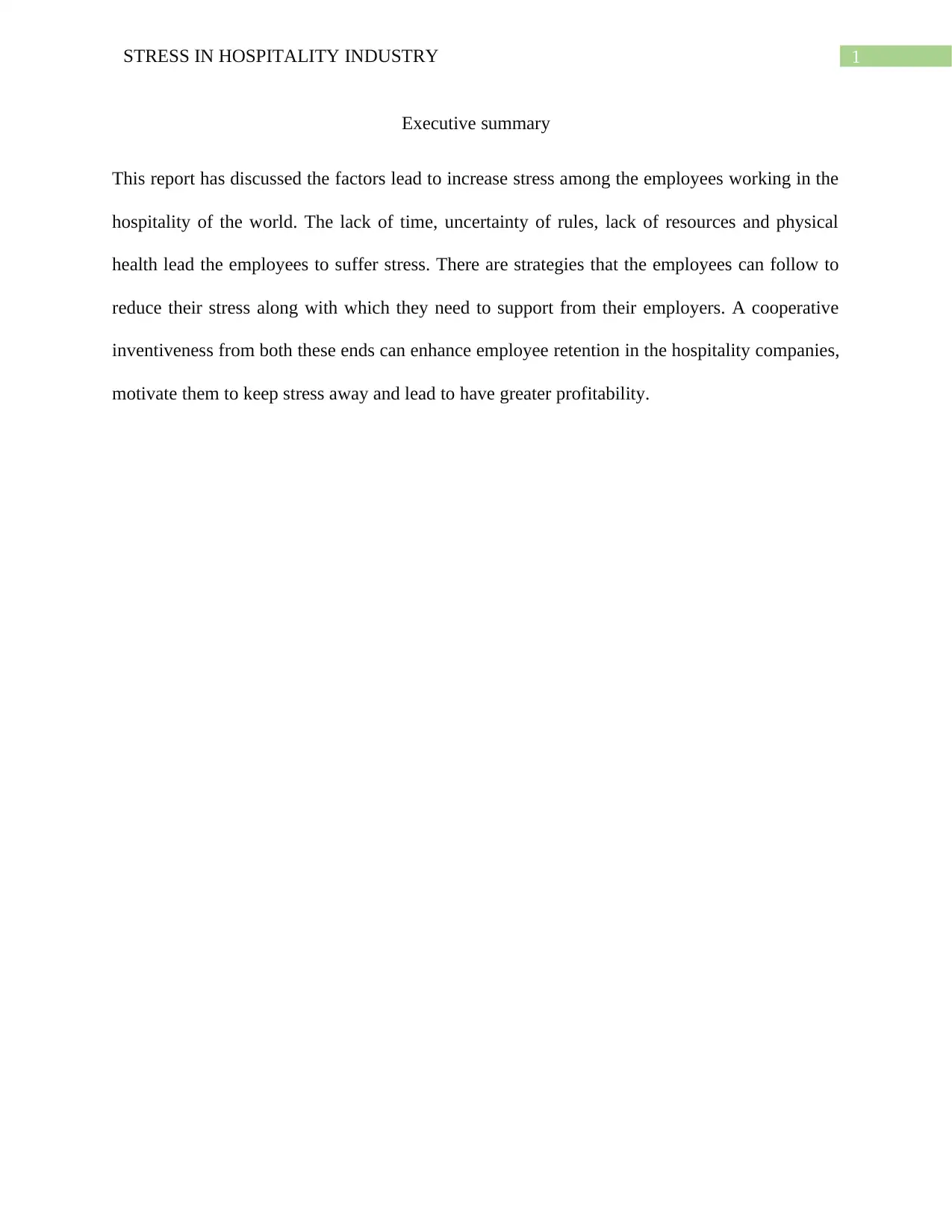
1STRESS IN HOSPITALITY INDUSTRY
Executive summary
This report has discussed the factors lead to increase stress among the employees working in the
hospitality of the world. The lack of time, uncertainty of rules, lack of resources and physical
health lead the employees to suffer stress. There are strategies that the employees can follow to
reduce their stress along with which they need to support from their employers. A cooperative
inventiveness from both these ends can enhance employee retention in the hospitality companies,
motivate them to keep stress away and lead to have greater profitability.
Executive summary
This report has discussed the factors lead to increase stress among the employees working in the
hospitality of the world. The lack of time, uncertainty of rules, lack of resources and physical
health lead the employees to suffer stress. There are strategies that the employees can follow to
reduce their stress along with which they need to support from their employers. A cooperative
inventiveness from both these ends can enhance employee retention in the hospitality companies,
motivate them to keep stress away and lead to have greater profitability.
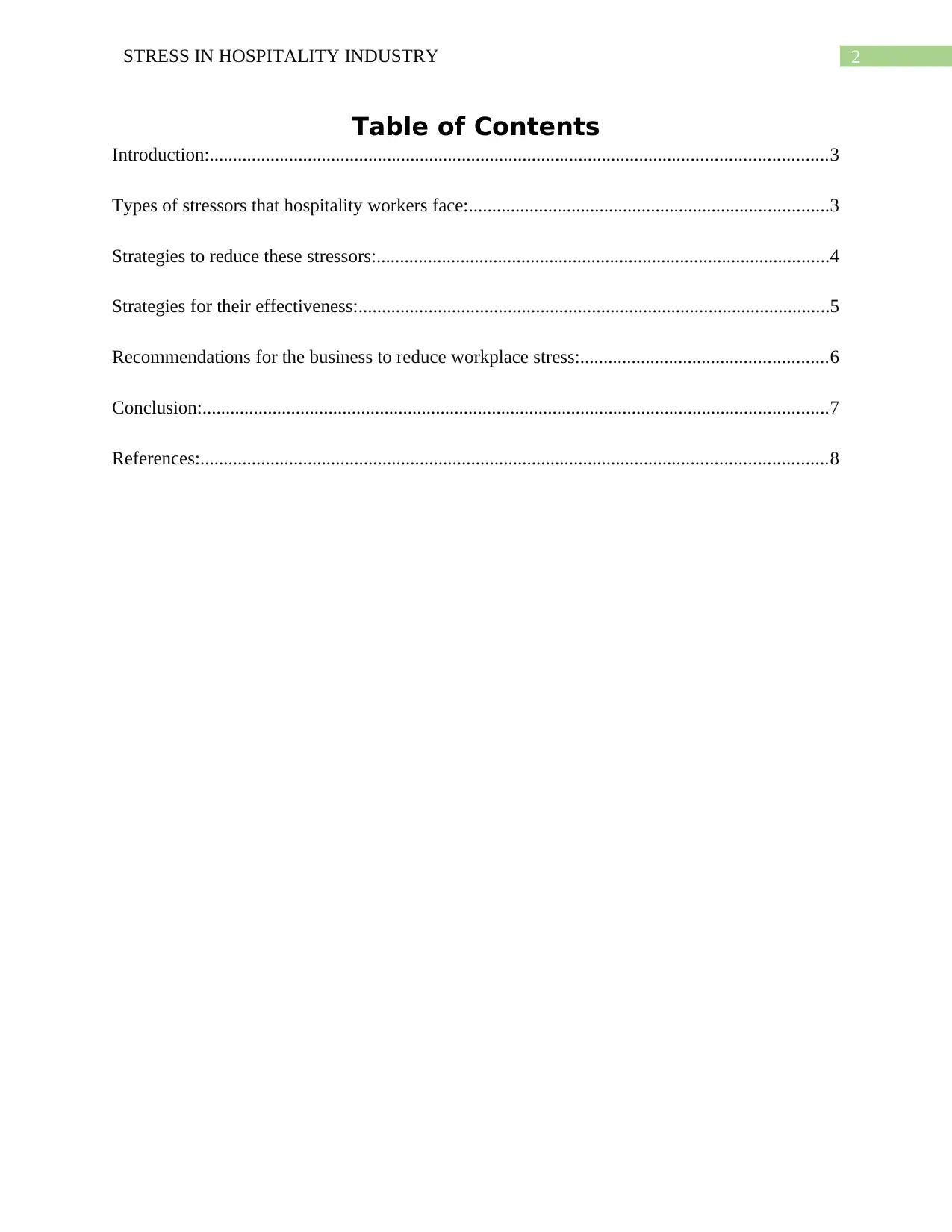
2STRESS IN HOSPITALITY INDUSTRY
Table of Contents
Introduction:....................................................................................................................................3
Types of stressors that hospitality workers face:.............................................................................3
Strategies to reduce these stressors:.................................................................................................4
Strategies for their effectiveness:.....................................................................................................5
Recommendations for the business to reduce workplace stress:.....................................................6
Conclusion:......................................................................................................................................7
References:......................................................................................................................................8
Table of Contents
Introduction:....................................................................................................................................3
Types of stressors that hospitality workers face:.............................................................................3
Strategies to reduce these stressors:.................................................................................................4
Strategies for their effectiveness:.....................................................................................................5
Recommendations for the business to reduce workplace stress:.....................................................6
Conclusion:......................................................................................................................................7
References:......................................................................................................................................8
⊘ This is a preview!⊘
Do you want full access?
Subscribe today to unlock all pages.

Trusted by 1+ million students worldwide
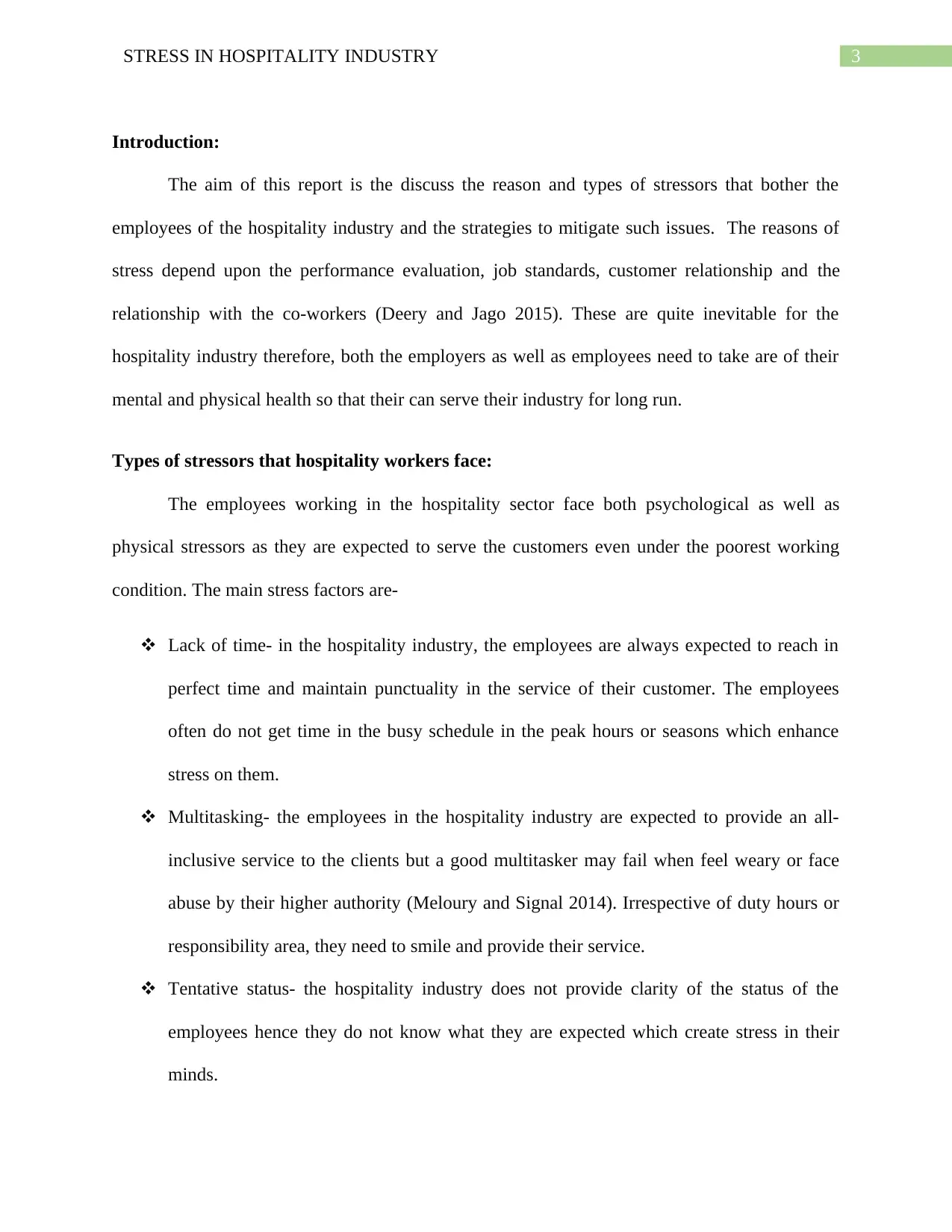
3STRESS IN HOSPITALITY INDUSTRY
Introduction:
The aim of this report is the discuss the reason and types of stressors that bother the
employees of the hospitality industry and the strategies to mitigate such issues. The reasons of
stress depend upon the performance evaluation, job standards, customer relationship and the
relationship with the co-workers (Deery and Jago 2015). These are quite inevitable for the
hospitality industry therefore, both the employers as well as employees need to take are of their
mental and physical health so that their can serve their industry for long run.
Types of stressors that hospitality workers face:
The employees working in the hospitality sector face both psychological as well as
physical stressors as they are expected to serve the customers even under the poorest working
condition. The main stress factors are-
Lack of time- in the hospitality industry, the employees are always expected to reach in
perfect time and maintain punctuality in the service of their customer. The employees
often do not get time in the busy schedule in the peak hours or seasons which enhance
stress on them.
Multitasking- the employees in the hospitality industry are expected to provide an all-
inclusive service to the clients but a good multitasker may fail when feel weary or face
abuse by their higher authority (Meloury and Signal 2014). Irrespective of duty hours or
responsibility area, they need to smile and provide their service.
Tentative status- the hospitality industry does not provide clarity of the status of the
employees hence they do not know what they are expected which create stress in their
minds.
Introduction:
The aim of this report is the discuss the reason and types of stressors that bother the
employees of the hospitality industry and the strategies to mitigate such issues. The reasons of
stress depend upon the performance evaluation, job standards, customer relationship and the
relationship with the co-workers (Deery and Jago 2015). These are quite inevitable for the
hospitality industry therefore, both the employers as well as employees need to take are of their
mental and physical health so that their can serve their industry for long run.
Types of stressors that hospitality workers face:
The employees working in the hospitality sector face both psychological as well as
physical stressors as they are expected to serve the customers even under the poorest working
condition. The main stress factors are-
Lack of time- in the hospitality industry, the employees are always expected to reach in
perfect time and maintain punctuality in the service of their customer. The employees
often do not get time in the busy schedule in the peak hours or seasons which enhance
stress on them.
Multitasking- the employees in the hospitality industry are expected to provide an all-
inclusive service to the clients but a good multitasker may fail when feel weary or face
abuse by their higher authority (Meloury and Signal 2014). Irrespective of duty hours or
responsibility area, they need to smile and provide their service.
Tentative status- the hospitality industry does not provide clarity of the status of the
employees hence they do not know what they are expected which create stress in their
minds.
Paraphrase This Document
Need a fresh take? Get an instant paraphrase of this document with our AI Paraphraser
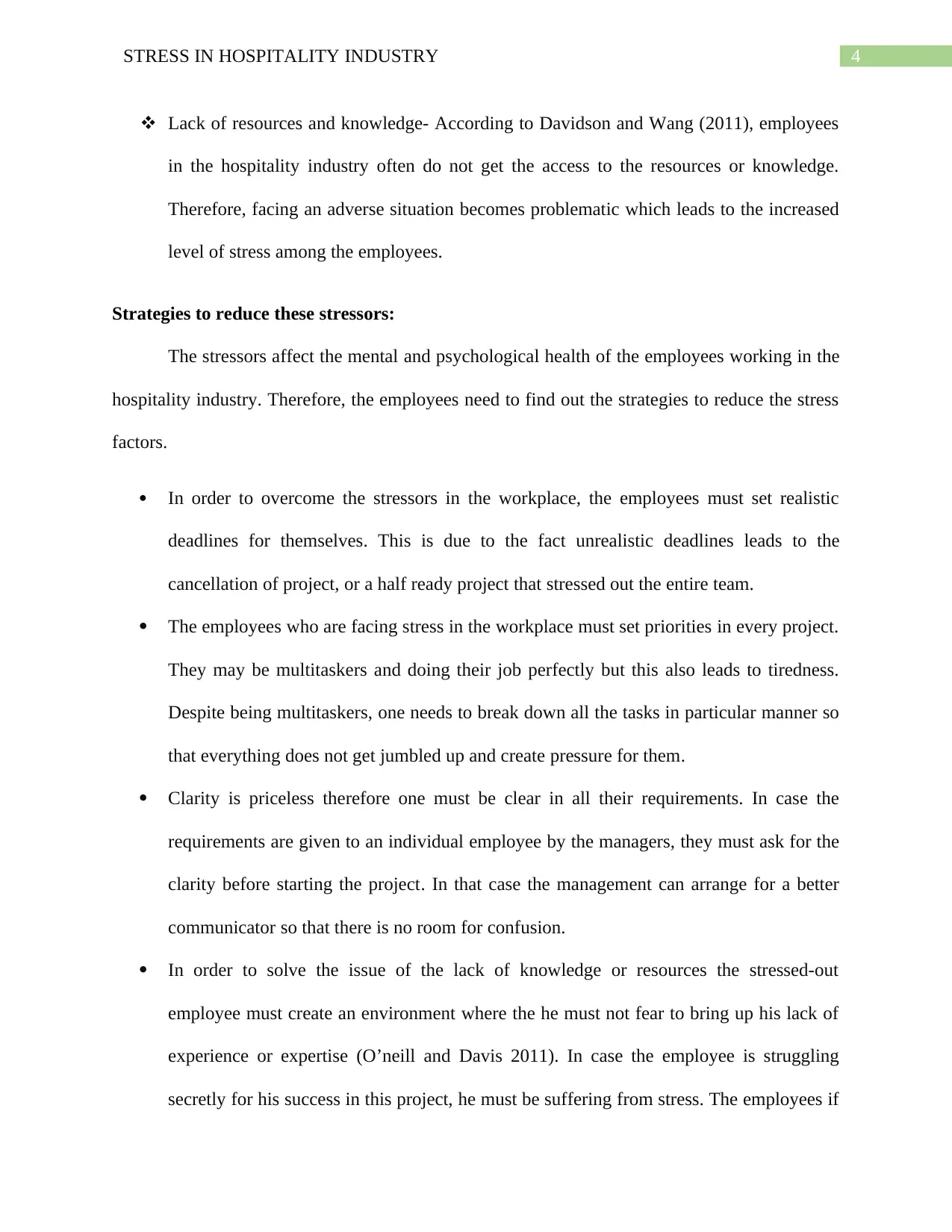
4STRESS IN HOSPITALITY INDUSTRY
Lack of resources and knowledge- According to Davidson and Wang (2011), employees
in the hospitality industry often do not get the access to the resources or knowledge.
Therefore, facing an adverse situation becomes problematic which leads to the increased
level of stress among the employees.
Strategies to reduce these stressors:
The stressors affect the mental and psychological health of the employees working in the
hospitality industry. Therefore, the employees need to find out the strategies to reduce the stress
factors.
In order to overcome the stressors in the workplace, the employees must set realistic
deadlines for themselves. This is due to the fact unrealistic deadlines leads to the
cancellation of project, or a half ready project that stressed out the entire team.
The employees who are facing stress in the workplace must set priorities in every project.
They may be multitaskers and doing their job perfectly but this also leads to tiredness.
Despite being multitaskers, one needs to break down all the tasks in particular manner so
that everything does not get jumbled up and create pressure for them.
Clarity is priceless therefore one must be clear in all their requirements. In case the
requirements are given to an individual employee by the managers, they must ask for the
clarity before starting the project. In that case the management can arrange for a better
communicator so that there is no room for confusion.
In order to solve the issue of the lack of knowledge or resources the stressed-out
employee must create an environment where the he must not fear to bring up his lack of
experience or expertise (O’neill and Davis 2011). In case the employee is struggling
secretly for his success in this project, he must be suffering from stress. The employees if
Lack of resources and knowledge- According to Davidson and Wang (2011), employees
in the hospitality industry often do not get the access to the resources or knowledge.
Therefore, facing an adverse situation becomes problematic which leads to the increased
level of stress among the employees.
Strategies to reduce these stressors:
The stressors affect the mental and psychological health of the employees working in the
hospitality industry. Therefore, the employees need to find out the strategies to reduce the stress
factors.
In order to overcome the stressors in the workplace, the employees must set realistic
deadlines for themselves. This is due to the fact unrealistic deadlines leads to the
cancellation of project, or a half ready project that stressed out the entire team.
The employees who are facing stress in the workplace must set priorities in every project.
They may be multitaskers and doing their job perfectly but this also leads to tiredness.
Despite being multitaskers, one needs to break down all the tasks in particular manner so
that everything does not get jumbled up and create pressure for them.
Clarity is priceless therefore one must be clear in all their requirements. In case the
requirements are given to an individual employee by the managers, they must ask for the
clarity before starting the project. In that case the management can arrange for a better
communicator so that there is no room for confusion.
In order to solve the issue of the lack of knowledge or resources the stressed-out
employee must create an environment where the he must not fear to bring up his lack of
experience or expertise (O’neill and Davis 2011). In case the employee is struggling
secretly for his success in this project, he must be suffering from stress. The employees if
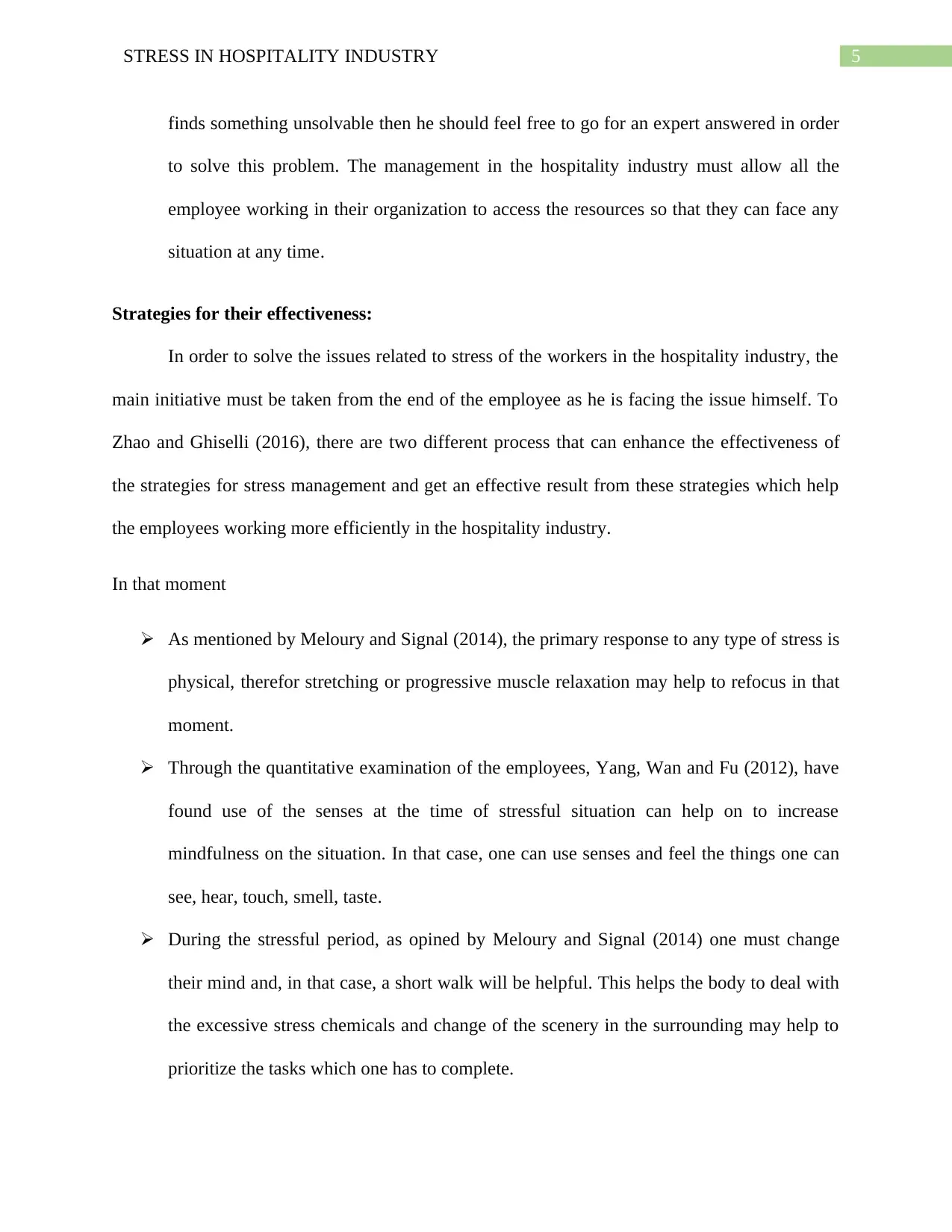
5STRESS IN HOSPITALITY INDUSTRY
finds something unsolvable then he should feel free to go for an expert answered in order
to solve this problem. The management in the hospitality industry must allow all the
employee working in their organization to access the resources so that they can face any
situation at any time.
Strategies for their effectiveness:
In order to solve the issues related to stress of the workers in the hospitality industry, the
main initiative must be taken from the end of the employee as he is facing the issue himself. To
Zhao and Ghiselli (2016), there are two different process that can enhance the effectiveness of
the strategies for stress management and get an effective result from these strategies which help
the employees working more efficiently in the hospitality industry.
In that moment
As mentioned by Meloury and Signal (2014), the primary response to any type of stress is
physical, therefor stretching or progressive muscle relaxation may help to refocus in that
moment.
Through the quantitative examination of the employees, Yang, Wan and Fu (2012), have
found use of the senses at the time of stressful situation can help on to increase
mindfulness on the situation. In that case, one can use senses and feel the things one can
see, hear, touch, smell, taste.
During the stressful period, as opined by Meloury and Signal (2014) one must change
their mind and, in that case, a short walk will be helpful. This helps the body to deal with
the excessive stress chemicals and change of the scenery in the surrounding may help to
prioritize the tasks which one has to complete.
finds something unsolvable then he should feel free to go for an expert answered in order
to solve this problem. The management in the hospitality industry must allow all the
employee working in their organization to access the resources so that they can face any
situation at any time.
Strategies for their effectiveness:
In order to solve the issues related to stress of the workers in the hospitality industry, the
main initiative must be taken from the end of the employee as he is facing the issue himself. To
Zhao and Ghiselli (2016), there are two different process that can enhance the effectiveness of
the strategies for stress management and get an effective result from these strategies which help
the employees working more efficiently in the hospitality industry.
In that moment
As mentioned by Meloury and Signal (2014), the primary response to any type of stress is
physical, therefor stretching or progressive muscle relaxation may help to refocus in that
moment.
Through the quantitative examination of the employees, Yang, Wan and Fu (2012), have
found use of the senses at the time of stressful situation can help on to increase
mindfulness on the situation. In that case, one can use senses and feel the things one can
see, hear, touch, smell, taste.
During the stressful period, as opined by Meloury and Signal (2014) one must change
their mind and, in that case, a short walk will be helpful. This helps the body to deal with
the excessive stress chemicals and change of the scenery in the surrounding may help to
prioritize the tasks which one has to complete.
⊘ This is a preview!⊘
Do you want full access?
Subscribe today to unlock all pages.

Trusted by 1+ million students worldwide
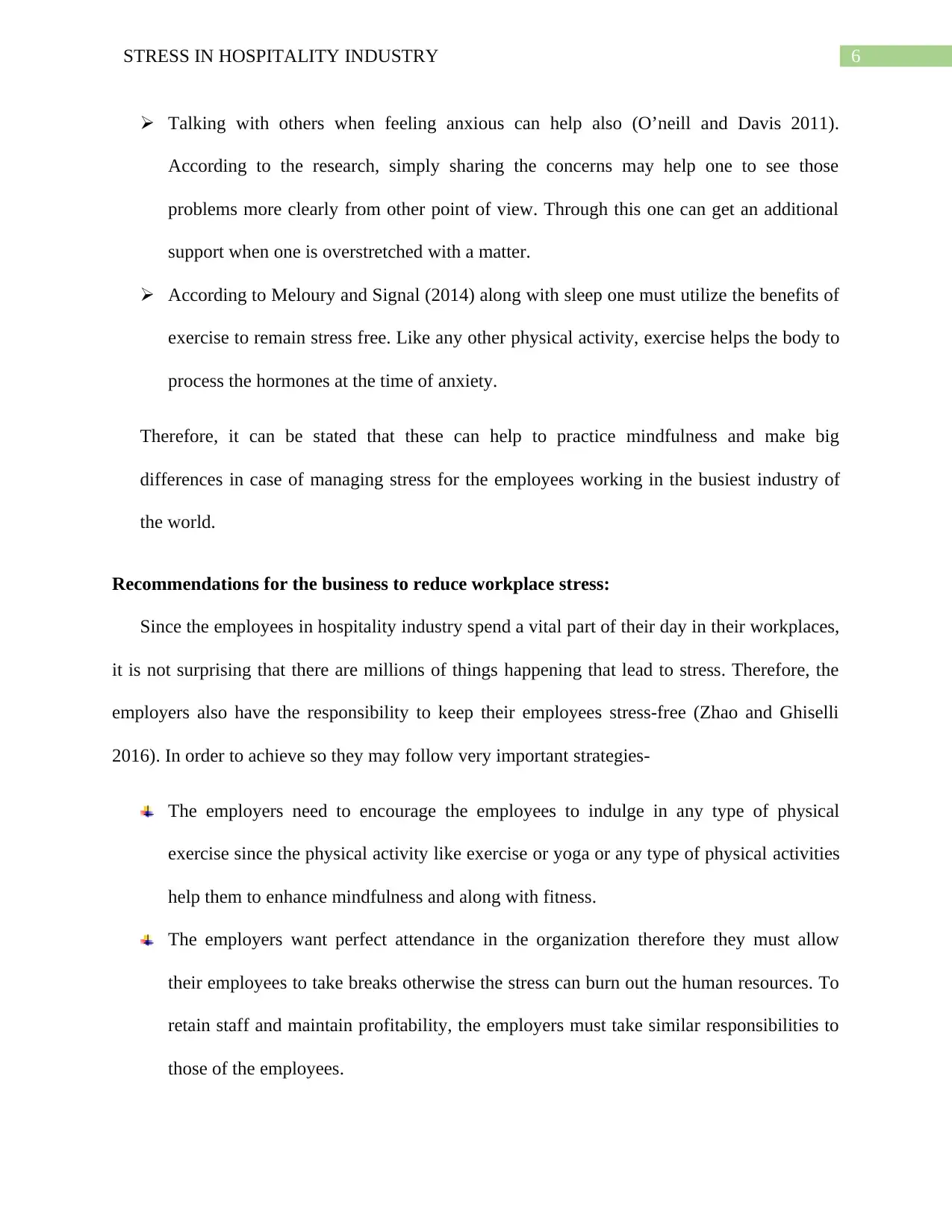
6STRESS IN HOSPITALITY INDUSTRY
Talking with others when feeling anxious can help also (O’neill and Davis 2011).
According to the research, simply sharing the concerns may help one to see those
problems more clearly from other point of view. Through this one can get an additional
support when one is overstretched with a matter.
According to Meloury and Signal (2014) along with sleep one must utilize the benefits of
exercise to remain stress free. Like any other physical activity, exercise helps the body to
process the hormones at the time of anxiety.
Therefore, it can be stated that these can help to practice mindfulness and make big
differences in case of managing stress for the employees working in the busiest industry of
the world.
Recommendations for the business to reduce workplace stress:
Since the employees in hospitality industry spend a vital part of their day in their workplaces,
it is not surprising that there are millions of things happening that lead to stress. Therefore, the
employers also have the responsibility to keep their employees stress-free (Zhao and Ghiselli
2016). In order to achieve so they may follow very important strategies-
The employers need to encourage the employees to indulge in any type of physical
exercise since the physical activity like exercise or yoga or any type of physical activities
help them to enhance mindfulness and along with fitness.
The employers want perfect attendance in the organization therefore they must allow
their employees to take breaks otherwise the stress can burn out the human resources. To
retain staff and maintain profitability, the employers must take similar responsibilities to
those of the employees.
Talking with others when feeling anxious can help also (O’neill and Davis 2011).
According to the research, simply sharing the concerns may help one to see those
problems more clearly from other point of view. Through this one can get an additional
support when one is overstretched with a matter.
According to Meloury and Signal (2014) along with sleep one must utilize the benefits of
exercise to remain stress free. Like any other physical activity, exercise helps the body to
process the hormones at the time of anxiety.
Therefore, it can be stated that these can help to practice mindfulness and make big
differences in case of managing stress for the employees working in the busiest industry of
the world.
Recommendations for the business to reduce workplace stress:
Since the employees in hospitality industry spend a vital part of their day in their workplaces,
it is not surprising that there are millions of things happening that lead to stress. Therefore, the
employers also have the responsibility to keep their employees stress-free (Zhao and Ghiselli
2016). In order to achieve so they may follow very important strategies-
The employers need to encourage the employees to indulge in any type of physical
exercise since the physical activity like exercise or yoga or any type of physical activities
help them to enhance mindfulness and along with fitness.
The employers want perfect attendance in the organization therefore they must allow
their employees to take breaks otherwise the stress can burn out the human resources. To
retain staff and maintain profitability, the employers must take similar responsibilities to
those of the employees.
Paraphrase This Document
Need a fresh take? Get an instant paraphrase of this document with our AI Paraphraser
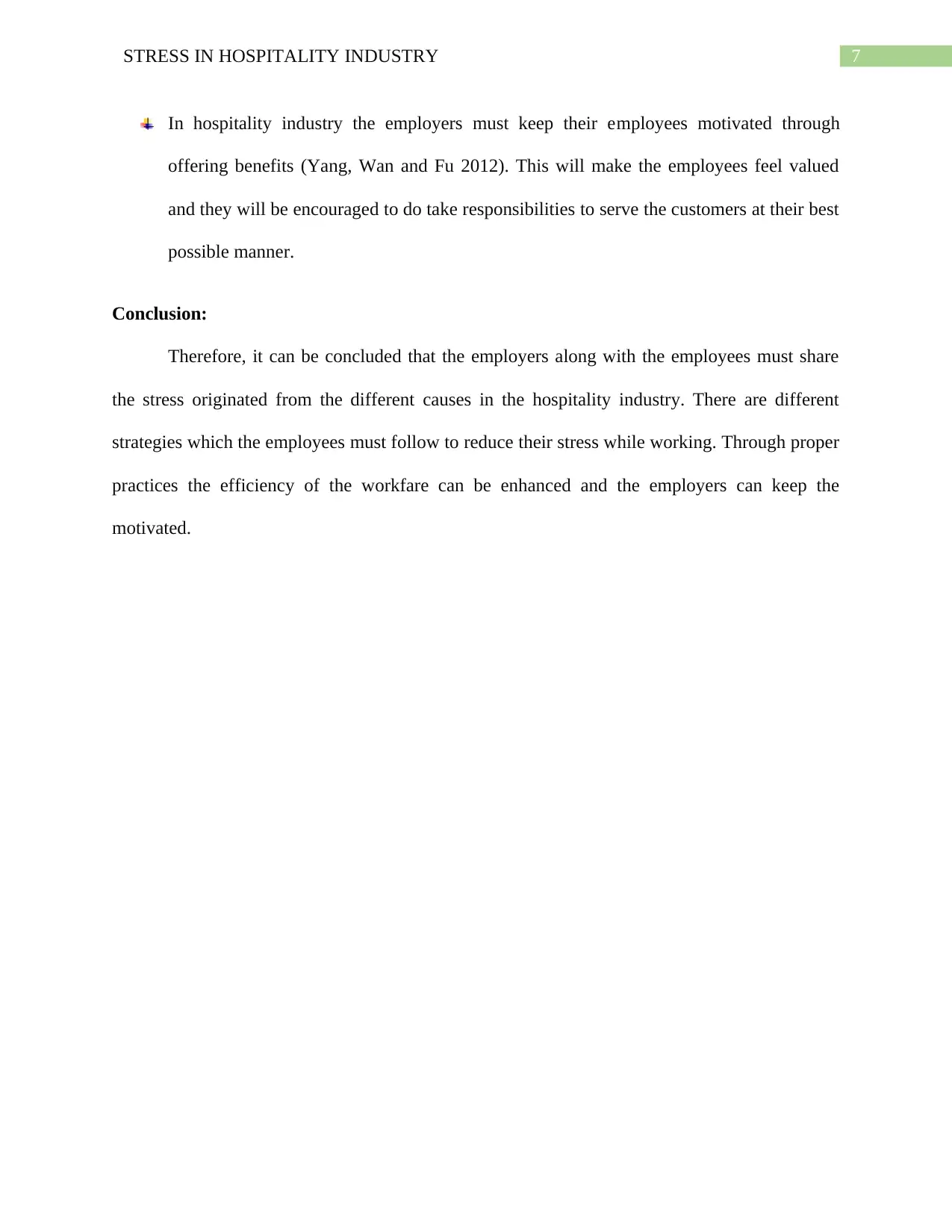
7STRESS IN HOSPITALITY INDUSTRY
In hospitality industry the employers must keep their employees motivated through
offering benefits (Yang, Wan and Fu 2012). This will make the employees feel valued
and they will be encouraged to do take responsibilities to serve the customers at their best
possible manner.
Conclusion:
Therefore, it can be concluded that the employers along with the employees must share
the stress originated from the different causes in the hospitality industry. There are different
strategies which the employees must follow to reduce their stress while working. Through proper
practices the efficiency of the workfare can be enhanced and the employers can keep the
motivated.
In hospitality industry the employers must keep their employees motivated through
offering benefits (Yang, Wan and Fu 2012). This will make the employees feel valued
and they will be encouraged to do take responsibilities to serve the customers at their best
possible manner.
Conclusion:
Therefore, it can be concluded that the employers along with the employees must share
the stress originated from the different causes in the hospitality industry. There are different
strategies which the employees must follow to reduce their stress while working. Through proper
practices the efficiency of the workfare can be enhanced and the employers can keep the
motivated.
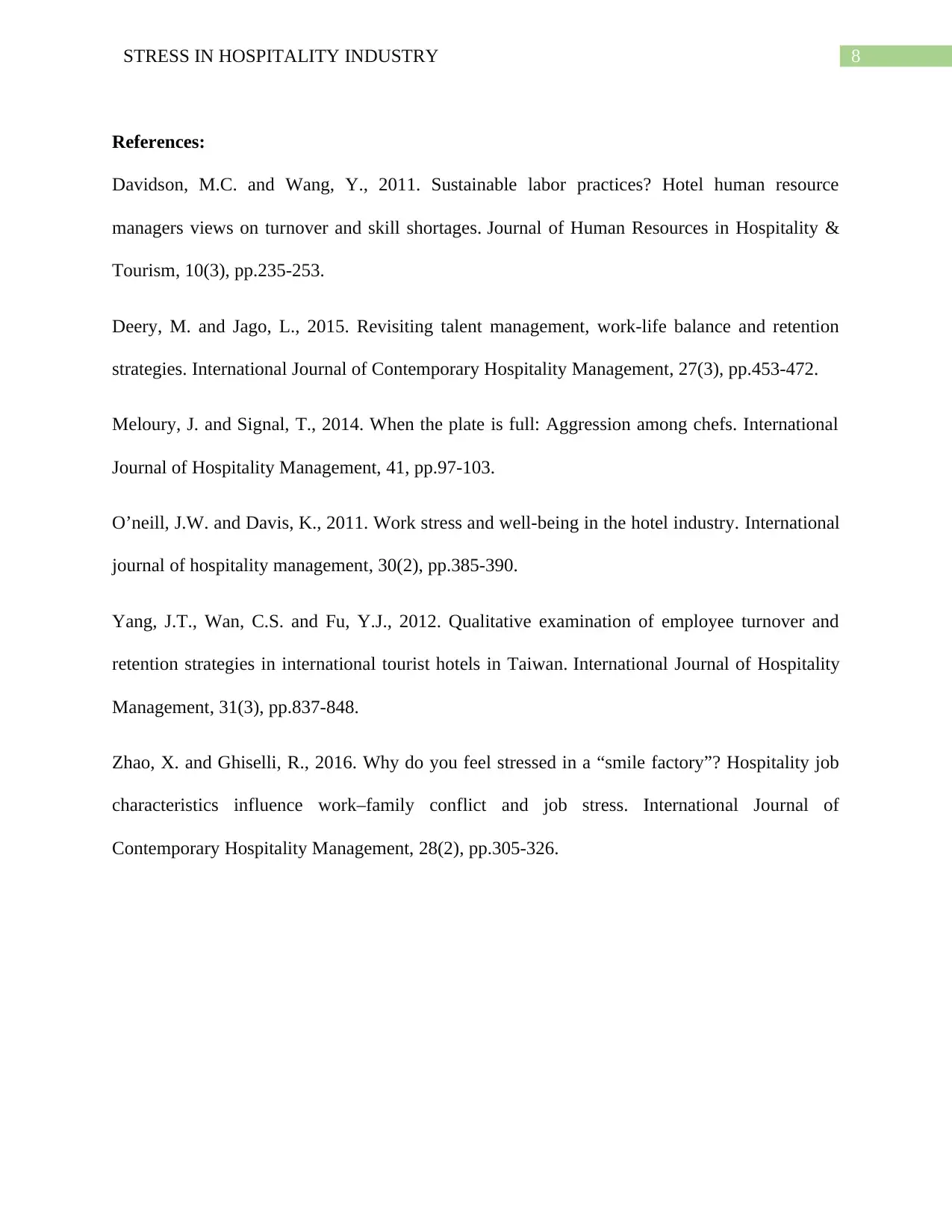
8STRESS IN HOSPITALITY INDUSTRY
References:
Davidson, M.C. and Wang, Y., 2011. Sustainable labor practices? Hotel human resource
managers views on turnover and skill shortages. Journal of Human Resources in Hospitality &
Tourism, 10(3), pp.235-253.
Deery, M. and Jago, L., 2015. Revisiting talent management, work-life balance and retention
strategies. International Journal of Contemporary Hospitality Management, 27(3), pp.453-472.
Meloury, J. and Signal, T., 2014. When the plate is full: Aggression among chefs. International
Journal of Hospitality Management, 41, pp.97-103.
O’neill, J.W. and Davis, K., 2011. Work stress and well-being in the hotel industry. International
journal of hospitality management, 30(2), pp.385-390.
Yang, J.T., Wan, C.S. and Fu, Y.J., 2012. Qualitative examination of employee turnover and
retention strategies in international tourist hotels in Taiwan. International Journal of Hospitality
Management, 31(3), pp.837-848.
Zhao, X. and Ghiselli, R., 2016. Why do you feel stressed in a “smile factory”? Hospitality job
characteristics influence work–family conflict and job stress. International Journal of
Contemporary Hospitality Management, 28(2), pp.305-326.
References:
Davidson, M.C. and Wang, Y., 2011. Sustainable labor practices? Hotel human resource
managers views on turnover and skill shortages. Journal of Human Resources in Hospitality &
Tourism, 10(3), pp.235-253.
Deery, M. and Jago, L., 2015. Revisiting talent management, work-life balance and retention
strategies. International Journal of Contemporary Hospitality Management, 27(3), pp.453-472.
Meloury, J. and Signal, T., 2014. When the plate is full: Aggression among chefs. International
Journal of Hospitality Management, 41, pp.97-103.
O’neill, J.W. and Davis, K., 2011. Work stress and well-being in the hotel industry. International
journal of hospitality management, 30(2), pp.385-390.
Yang, J.T., Wan, C.S. and Fu, Y.J., 2012. Qualitative examination of employee turnover and
retention strategies in international tourist hotels in Taiwan. International Journal of Hospitality
Management, 31(3), pp.837-848.
Zhao, X. and Ghiselli, R., 2016. Why do you feel stressed in a “smile factory”? Hospitality job
characteristics influence work–family conflict and job stress. International Journal of
Contemporary Hospitality Management, 28(2), pp.305-326.
⊘ This is a preview!⊘
Do you want full access?
Subscribe today to unlock all pages.

Trusted by 1+ million students worldwide
1 out of 9
Related Documents
Your All-in-One AI-Powered Toolkit for Academic Success.
+13062052269
info@desklib.com
Available 24*7 on WhatsApp / Email
![[object Object]](/_next/static/media/star-bottom.7253800d.svg)
Unlock your academic potential
Copyright © 2020–2026 A2Z Services. All Rights Reserved. Developed and managed by ZUCOL.





